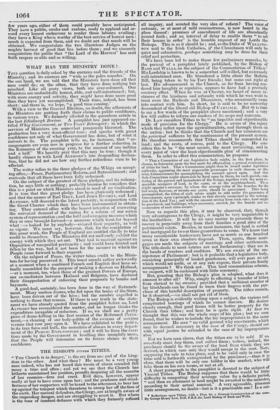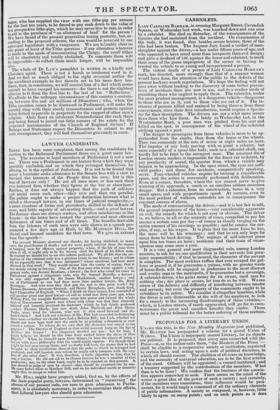THE BISHOPS versus TITHES.
"THE Church is in danger," is the cry from one end of the king- dom to the other. And what then ? He must be a very young man indeed, who has not heard this tocsin of alarm sounded full many a time and often ; and yet we see that the Church has hitherto maintained her position, proudly despising all the assaults of her enemies—firm and erect. Evil days, however, appear really at last to have come upon her; and the prudence and stead- fastness of her supporters will be taxed to the uttermost, to bear her up against the tempest which threatens to sweep her off the face of the earth. Her natural defenders, the Clergy, are at length aware of the impending danger, and are struggling to avert it. But where is the tone of insolent defiance with which they formerly refused all inquiry, and scouted the very idea of reform; The voice of entreaty, or at most of mild remonstrance, is now heard in the place thereof : promises of amendment of life are abundantly poured forth; and an interval of delay to enable them " to set their houses in order" is the humble request of my Lords the Bishops. This is as it should be ; and, as the Duke of WELLINGi. if TON said to the Irish Catholics, the Churchmen will only be quiet and submissive, perhaps something may be done for the •r relief and protection.
We have been led to make these few preliminary remarks, by the perusal of a pamphlet lately published, by the Bishop of BATH and WELLS, on the subject of the Commutation of Tithes.* His Lordship is known to be a somewhat self-willed, but extremely well-intentioned man. He blundered a little about the Reform Bill, being taken in by his Tory friends; but came out right at last. His advancement in the Church, so far from having ren- dered him haughty or repulsive, appears to lave had a precisely contrary effect. 'When he was at Chester, we heard of many in- stances of the kindness and urbanity with which he was wont to treat even the Radicals and Dissenters, who occasionally came into contact with him. In short, he is said to be no unworthy descendant of the liberal old Bishop of CARLISLE. But it is time to say a few words of the pamphlet above mentioned ; and a very few will suffice to inform our readers of its scope and contents. Dr. Law considers Tithes to be "an impolitic and objectionable mode of provision for the Clergy." He is aware of the injury which they inflict upon the agriculturalists, and through them on the nation : but he thinks that the Church and her ministers are the principal sufferers by the continuance of the present system. He therefore recommends that Tithes should be commuted for land; and the rents, of course, paid to the Clergy. He con- siders this to be "the most secure, the most unvarying, and in every point of view the least objectionable plan" of remunerating them. In order to effect this commutation, he proposes " That a Committee of our Legislative body might, in the first place, be chosen, to determine upon the best mode for effectuating a general commutation of tithes for land. That a Commission might then be issued under legislative authority, appointinc, the most respectable personages in each diocese, or dis- trict, Commissioners for accomplishing the measure agreed upon. And that Sub-Committees might afterwards be fixed upon by them, for each parish, con- sisting of the patrons and incumbents of the livings, together with the most re- spectable occupiers of land, in the same, or in the neighbourhood. The might appoint a surveyor, by whom the average value of the benefice for the last seven, fourteen, or twenty-one years, should be ascertained. This being accomplished, the tithes of each estate might be sold under the guarantee Of Government, upon a principle similar to that already recognized in the redemp- tion of the Land Tax; and with the amount arising from such sales, land might he purchased, and buildings, Where necessary, erected, for the benefit and re- muneration of each tithe-owner."
Now as regards this plan, it may be observed, that, though very advantageous to the Clergy, it might be very unpalatable to the landholders; It will be no easy matter to persuade them to convey in perpetuity away from their families a good slice of the patrimonial estate. Besides, in most instances, the land is settled and mortgaged for two or three generations to come. We know that many considerable landowners have not so much as one hundred acres at their own absolute disposal. Then, again, these mort- gages are made the subjects of marriage and other settlements. The title-deeds to most estates are not''forthcoming : they are in the hands of trustees and creditors. We are aware of the om- nipotence of Parliament : but is it probable that a legislative body, consisting principally of landed gentlemen, will ever pass an act which would set aside, or at any rate expose, their private family arrangements ? We think not. This land commutation scheme, we suspect, will be cushioned with little ceremony. But, granting that the Bishop's plan is adopted, what does it amount to after all? Why, simply to effecting a transfer of tithes from clerical to lay owners; • provided that a sufficient number of lay blockheads can be found to burn their fingers with the pur- chase of this hateful description of property. The tithes remain, be it observed,—we shall not get rid of them. The Bishop is evidently writing upon a subject, the various and complicated bearings of which he cannot discern. He desires clearly enough, that good farms will be better property for the Church than tithes; and here he is quite right. At first we thought that this was the whole scope of his plan ; but we soon found, that he wishes to include the lay impropriators in the same arrangement. He sees" no valid ground why enactments, which may be deemed necessary in the case of the Clergy, should not with equal justice be extended to the case of lay iinpropriators also:' But we have seen above, that the tithes are to be sold. If so, somebody must buy them, and collect them; unless' indeed, the purchaser should be the owner of the land from winch they are derived, in which case only they would merge in the rent. Now, supposing the sale to take place, and to be valid only in case the tithe sold is forthwith extinguished by the purchaser,—then it is clear, that there will be only one bidder in the market, who will take them on his own terms, or not at all. A short paragraph in the pamphlet is devoted to the subject of Vicarial Tithes. The Bishop supposes that there would be little difficulty in computing their average value for a definite period, "and then an allotment in land-might be awarded to the minister, according to their actual amount: A very agreeable, pleasant little arrangement, no doubt—but is it a practicable one? Is a cot- Reflections upon Tithes, with a Phin for a General Cominutation of the same. By George Henry Law, D.D. F.R.S. 8r.e. Lord Bishop of Bath and Wells. tsger, who has supplied the vicar with one tithe-pig per annum for the last ten years, to be forced to pay cash down to the value of ten prospective tithe-pigs, which he may never live to rear, in order to aid in the purchase of" an allotment of land" for the parson ? We have heard of the present generation taxing posterity, but, ac- cording to the proposed scheme, the case would be reversed by our episcopal legislators with a vengeance. We are tolerably clear on one point at least of the Tithe question if any alteration whatever is made in the mode of remunerating the Clergy, the small tithes will be absolutely and totally abolished. To commute them will be impossible—to collect them much longer, 'will be impossible also.
The whole of Dr. LAw's pamphlet is written in a kindly and Christian spirit. There is not a harsh or intolerant word in it. And we feel so much obliged to the right reverend author for the excellent example he has therein set to his more fiery bre- thren, that, in conclusion, we will remind him of a fact which seems entirely to have escaped his memory—for there is not the slightest allusion to it from the first line to the last of his "Reflections." We allude to the unhappy circumstance of this country's contain- ing between five and Six millions of Dissenters ; who, when the Tithe question comes to be discussed in Parliament, will make the country ring with their sturdy remonstrances and protests against being forced to provide in perpetuity for the support of other men's religion. Only fancy an intolerant Nonconformist (for such there are) being forced to parcel out little corners of his estate for the perpetual maintenance of the Church of England divines ! If Bishops and Statesmen expect the Dissenters to submit to any such arrangement, they will find themselves grievously in error.



























 Previous page
Previous page